Almost all NHS Nurses have considered leaving
Given this situation, it's no surprise that 86% of Nurses said they had considered leaving the NHS due to workforce number issues.
We asked this question:
Do you agree with this statement...
"I would consider leaving the NHS and the staffing situation is at least partly to blame".
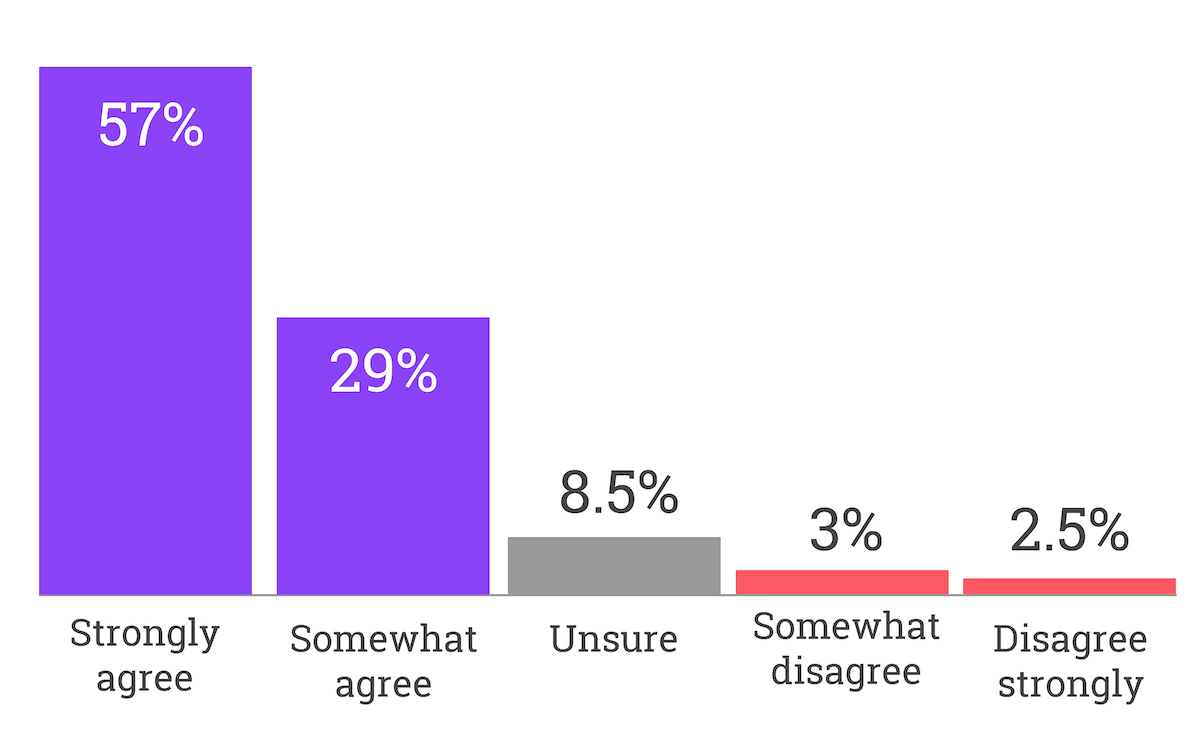 86% of Nurses would consider leaving the NHS, and the staffing crisis is at least partly to blame
86% of Nurses would consider leaving the NHS, and the staffing crisis is at least partly to blameThe survey showed that most Nurses working in the NHS feel a deep sense of pride in what they do.
But many are looking to retire early.
Others feel they need to move elsewhere to continue their career, directly as a result of staffing shortages.
Increase pay
Despite pay changes in 2018 nearly all respondents said nursing pay levels are a barrier to recruitment
Following the recession in 2008, Nursing pay faced a squeeze.
In the five years to 2015, standard Nursing wages increased by just 2.2% - out of sync with inflation.
Then, between 2015 and 2017, a 1% increase was implemented each year.
Last year the New Pay Deal was introduced.
From 2018, over the next three years, Nurses will see a minimum salary increase of 6.5%.
But, despite this, Nursing continues to be seen as a vocation done for love not money.
We wanted to find out if the New Pay Deal is one jigsaw piece that WILL help with recruitment and retention?
The consensus is: no, it's not enough.
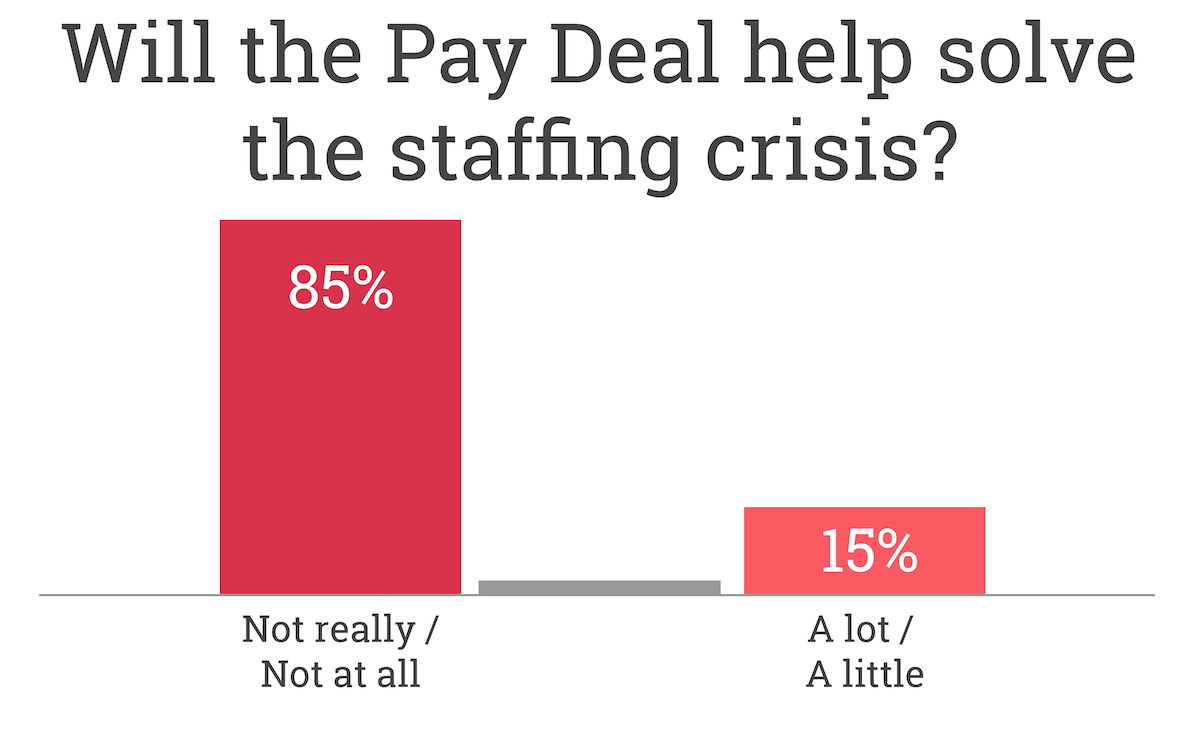 85% do not believe The New Pay deal will help solve the staffing crisis
85% do not believe The New Pay deal will help solve the staffing crisisHere are just two of the many comments about pay made by the respondents:
Nurse training policy
Scrapping the Student Nurse Bursary
In England, the student Nurse bursary (fees and grants) were scrapped under George Osborne.
In Scotland, where bursaries weren't scrapped, trainee nurse numbers continued to increase.
The Government shows no sign of bringing back bursaries in England.
And yet the Department of Health wishes to claim a commitment to training:
We wanted to find out what Nurses think about the Government's commitment to training without reviewing the Student Nurse bursary.
Second only to better pay, re-introducing bursaries for Student Nurses in England will have the biggest impact on relieving the shortage of Nurses:
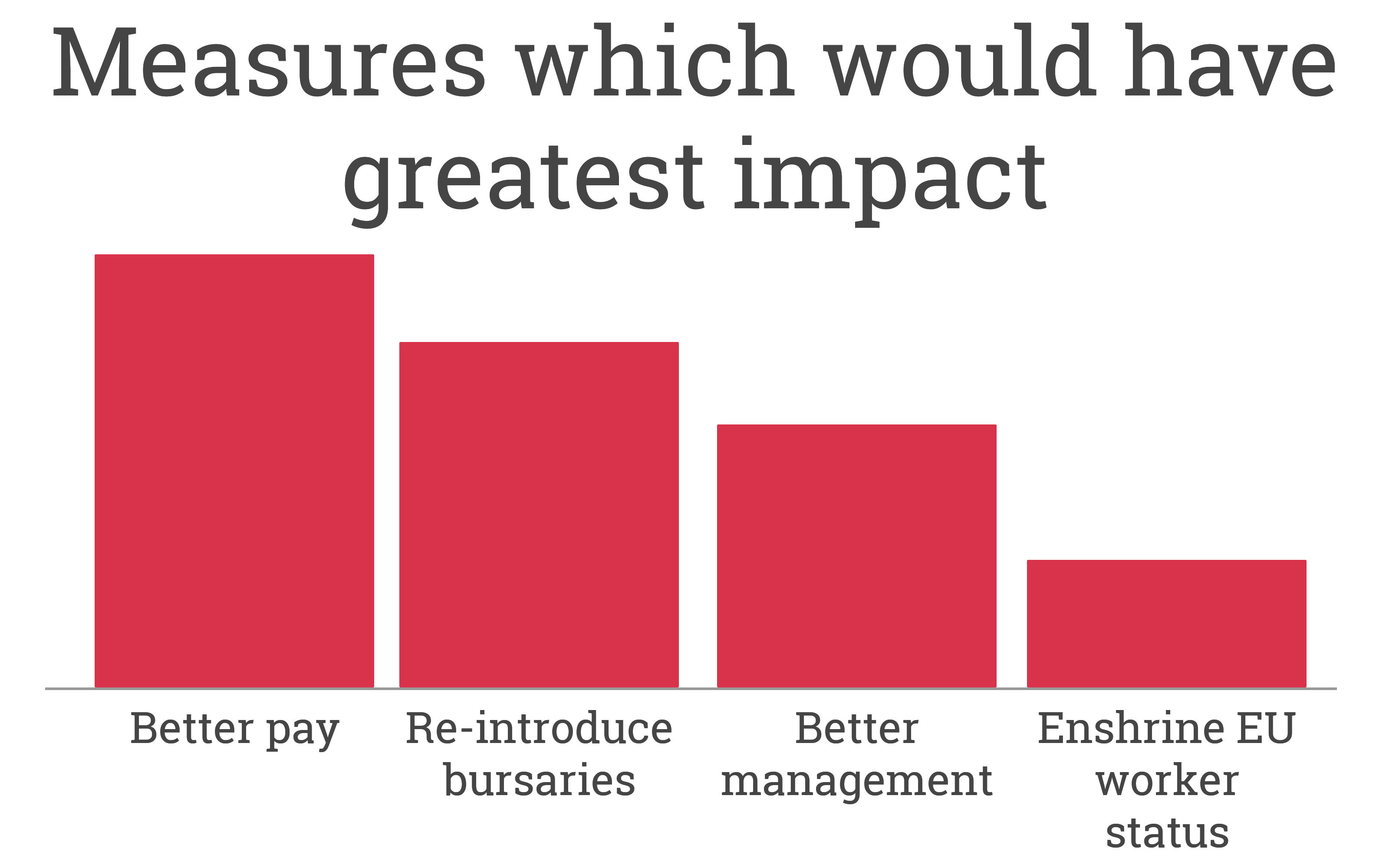 Measures which would have greatest impact on improving Nursing numbers in the workforce
Measures which would have greatest impact on improving Nursing numbers in the workforceNurses are sceptical that Government plans to train more nurses WITHOUT re-introducing bursaries will succeed.
The clear feeling among the Nurses we surveyed is that bursaries are necessary:
There were also a number of comments which indicate Student Nurses are NOT considered supernumerary. Instead, they are included in the staffing numbers - against RCN standards.
In summary, 88% of Nurses say that if the Government is serious about their commitment to training, they will need to re-introduce the bursary.
If the Government's Long Term Plan is going to be met, Nurses argue that Pay needs to be improved, and Bursaries need to be re-introduced.
More flexible hours
NHS Nurses who leave often state that they are looking for more flexible hours.
Long shifts and an inflexible approach to hours leads to stress and burn-out.
Agency nursing is appealing, especially for Nurses trying to raise a young family.
In total, three-quarters of Nurses believe a more flexible approach to hours would be valued.
Better leadership and support
We can hear in the many comments that our Nursing respondents volunteered that leadership, management and support are key areas.
According to Nurses, when management and pastoral care is done well it helps boost morale, reduces retention problems AND improves service levels.
There was so much strength of feeling about management.
The following, final comment, is long. But we felt it was worthy of inclusion in full:
Feeling valued by senior managers would have a [significant impact on relieving the shortage of nurses]. Some nurses choose to not go up the promotion ladder, preferring to have more patient contact. Some of these nurses are highly experienced professionals, but their views and suggestions in relation to improvements for patient care are dismissed by less experienced nurses who have climbed the promotion ladder simply because they can perform well at interviews. Looking after patients well can not be purely learnt from books. Therefore, the fact that a nurse can recite chapter and verse does not make him or her a good nurse and in turn make them a good senior manager .
Nurses themselves are suffering mentally and physically
Finally, we wanted to know how all of this is impacting the person, the Nurse, themselves.
Nurses are having to personally cover and manage the workload.
When a workload intended to be spread amongst more qualified nursing staff is soaked up by fewer people it will take its toll in a human way.
This is what we discovered...
94% of Nurses are more physically tired as a result of the shortage of Nursing staff.
92% of Nurses are feeling more stressed as a direct result of too few colleagues to share the workload expected of them
When the public hears about the 'National Emergency' of the Nursing shortage they rightly think of patients' health, and waiting lists.
But the hidden cost is the health of the Nurse doing the work.
We've read all of the comments sent to us during this survey. It is a bleak picture.
If we want an NHS that works for us, we need to think of the people who staff it.
What's striking is that at the heart of so many comments is a wish for better patient care and an empathy for the health of colleagues.
On that note, the last words need to go to this Nurse:
Staffing shortages are affecting our mental health. Charge nurses are constantly pushed for staff and are expected to come up with solutions to the problems. We are also constantly pushed for beds and also have a case load of patients to look after. It is simply not safe having all of this responsibility on the shoulders on senior charge and charge nurses - yes there are bed managers and heads of nursing but they do not understand just how demanding it is on the medical floor. My HoN has not been in practice for 15years! They forget how mentally and physically straining it is on staff and there is not thanks we are just expected to do this as part of the job.
Respondent profile
• 565 respondents
• 10 questions
• 554 personal written comments
• 73% work for the NHS
• 63% Adult Nurse
• 6% Mental Health Nurse
• 5% Children’s Nurse
• 5% Student Nurse
• 2% Learning Disability Nurse
Your comments
I feel that the NMC should loosen some band scores for overseas recruits. I have done all other Exams, including interviews and passed. Come the English test… it is a hard nut to crack. Maybe you can arrange or take it up to the register! Suggest they allow us to come and practice as pre-registered nurses whilst we work out our registration - especially the English language test. - Lorraine
Great survey, unfortunately with 36 years experience, none of your results surprised me one bit. I credit you for carrying out this much needed survey and attempting to keep the focus on safe staffing. - Steven
Indeed, Matt, I agree with all you say. I'm a Nurse Practitioner about to change surgeries due to feeling undermined, undervalued and underpaid. The Practice just can't find a replacement for me or the Practice Nurse who also left for better pay and career progression. I think the Practice going to experiment with having a prescribing pharmacist to do the Minor Illness I currently do. I don't see that a pharmacist could possibly do what I do (without that being in anyway arrogant to say). I remain totally exasperated and actually very sad for the NHS - it's on the "highway to hell" I fear. - Debra
Hi Matt, I really enjoyed reading your article on the Nursing Crisis and wanted to share my story with you. I began working as a HCA In an Adults hospice at the age of just 18. I absolutely adored it and at the age of 23 decided to take the leap to become a nurse! Therefore left and joined my local hospital. I was absolutely shocked at the level of care compromised due to understaffed wards. I was counted in the numbers daily although having very little hospital experience. At it’s worse I was sent to a ward to work ALONE with over 15 patients. I felt so under supported by management. I found it too distressing to watch patients suffering due to the lack of staff and would work overtime wherever I could. After just three months working as a student nurse in the NHS, my mental health (something I had never suffered with before) was unfortunately too bad that I felt I had no other option than to give up my career in nursing. I was heartbroken to have to do this and feel my kind heart was a great loss to the NHS due to the NHS crisis. I feel there is a higher ratio of nurses on wards in order to support student nurses, it will become increasingly difficult not just to recruit aspiring nurses but to retain them as well! - Mollie
I was a mental health nurse working in private dementia nursing homes for about 20 years. Working 12 hour shifts, often without adequate breaks. Recently I left my job and allowed my registration to lapse. The crisis is not just in the NHS, it's a UK nursing crisis. - Ruby
I am not surprised to read the results of your survey. I left nursing after 20 years due to becoming ill. This was in part due to unbearable stress and bullying that I endured in the last year of my career. I have a BSc degree and specialist knowledge of MS, all now going to waste. I haven’t worked since last year and I’m now looking for part time non nursing jobs. - Anna
If a nurse becomes unemployed for some reason, or takes a break for some reason, the NMC make it hard for them to re-register, as they need references about their employment. But if they have not been working this is difficult. And how does someone on JSA afford the £120 out of their dole money? - Dion
Thank you Matt. I am Randy and have been a Nurse for the past 17 years. I would like to comment on the salary of nurses, I have studied HRM and General Management with an MBA. While we understand that 'money is not a motivator' we need to also understand that the absence of it is de-motivating. Like any one we want to be comfortable, live happy, meaningful lives, have fun with our family, go on vacation, have a good car to drive. - Randy
I am a UK trained nurse who has worked in the NHS then went into the private sector. I then worked overseas. But when I come home for periods of time I cannot find work in the NHS now as I have worked in Age Care. I have been qualified for 14 years and have extensive knowledge. To be told I do not have relevant experience is a slap in the face. Policy needs to be changed. - Angelia
The nurses pay is poor in the UK and that is one of the reasons why nurses are emigrating to other country with better wages. - Adelere
All I have read is so true. I once worked in cancer care but due to poor staffing levels and leadership I had to leave for my physical and mental health. I continue to nurse but about to take early retirement as my health is more important. One fact that I feel has not helped has been the 12.5 he shifts. Many nurses prefer them but those same nurses are burnt out and miss quality time with their family. - Jayne
After 43 years as a nurse I have recently given up my registration. It saddens me. The whole system of care is so fragmented and bureaucratic. It is cause for discontent and frustration. Back to basics is needed - and putting the patient first. - Irene
I have just completed my Return to Practice course after a 14 year break. I had wide nursing experience prior to my break to have children. I have applied for 4 basic Band 5 Staff Nurse posts and have not been offered a job. I wasn’t even shortlisted for a gynae surgical post despite being a midwife and having done my Return to Practice placement on a Surgical Unit. I didn’t hear back at all from 2 of the applications and was unsuccessful at interview for the 4th. I don’t understand how this has happened. - Stephanie
Unfortunately after 40 years in NHS this month this does not come as a shock, only a confirmation of what I see on a daily basis. During that time I have worked in places from Inverness to London and several places in between. I also worked as union steward in one of my work places for 10 years. I have witnessed the appalling waste of money and the constant tinkering in the NHS every time the government changes. I get bored of politicians of every hue spouting that they have increased the number of staff they have appointed whilst in office, whilst all the time the reality on the front line is less staff appear to be present, and the vacancies soar. - Thomas
I know many nurses choose to do the work they do because they want to care. However, generally, nurses soon realise that, to work through an agency, where shifts can be chosen at will and pay is significantly higher than that paid in the NHS, offers a very lucrative career choice. I am certain that if agencies paid the same rates as paid by the NHS, there would be a huge migration of agency workers wanting to secure definite contracts. I doubt anyone will take much notice of this as sadly common sense does not always prevail in what is an emotive topic for the general public. - Elizabeth
Why should the nurse be expected to fully perform a carer's task? This adds load to their physical strain and a need to hurry over their work with reduced concentration leading to issues like drug errors. If the nurse stuck to his / her nursing and managerial duties and assisted only where necessary, she / he would be less physically and mentally vulnerable. Thanks. - Betty
Matt, after nursing for 45 years I can say that this situation is unprecedented and a national disgrace. It has been known for over 20 yrs that there would be a shortage of nurses once people in my age group retired (so thats pre-Brexit and pre-abolition of the bursary). The government absolutely refuses to acknowledge the crisis. Their answer seems to be to fast-track a lesser qualified “nurse associate” to do the work of the registered nurses for less pay. When I started my training in 1974 qualified nurses were respected. We didnt have ex-supermarket managers with degrees deciding what we should do and how fast we need to do it (treating patients like numbers) everything centred around the patient. - Laraine
 We surveyed 550 Nurses about the NHS staffing crisis. Here's what we found out...
We surveyed 550 Nurses about the NHS staffing crisis. Here's what we found out...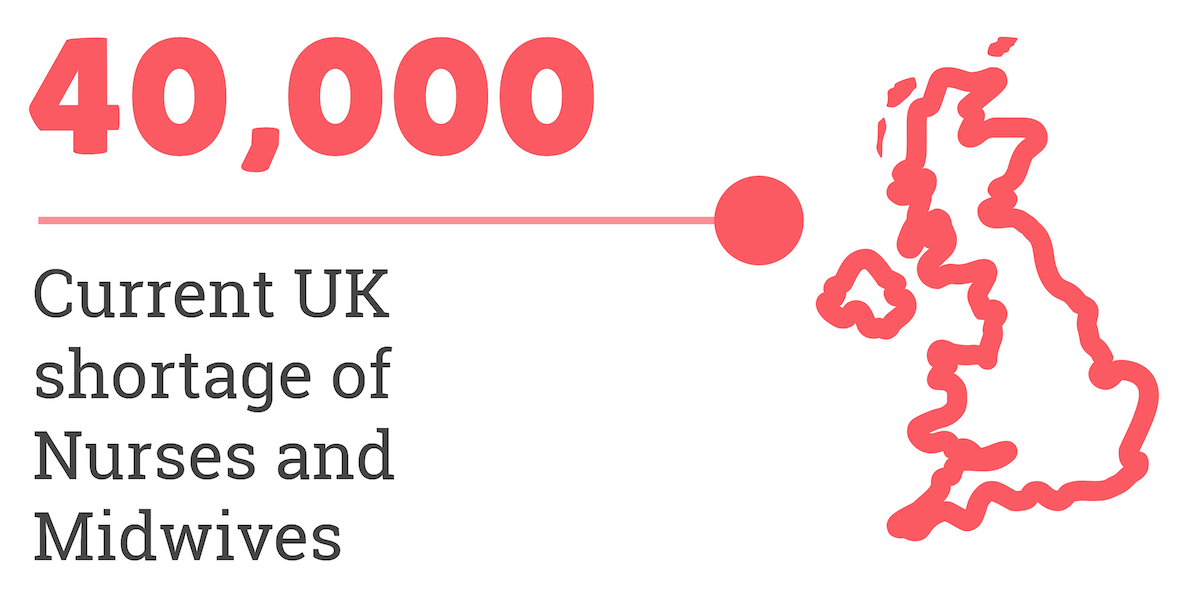

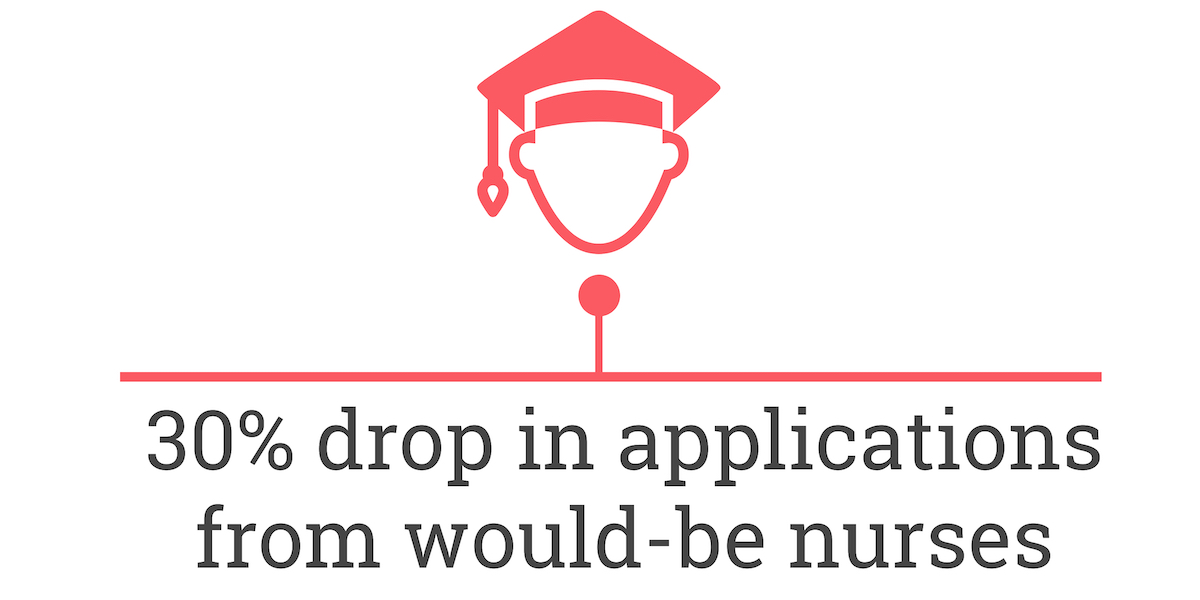
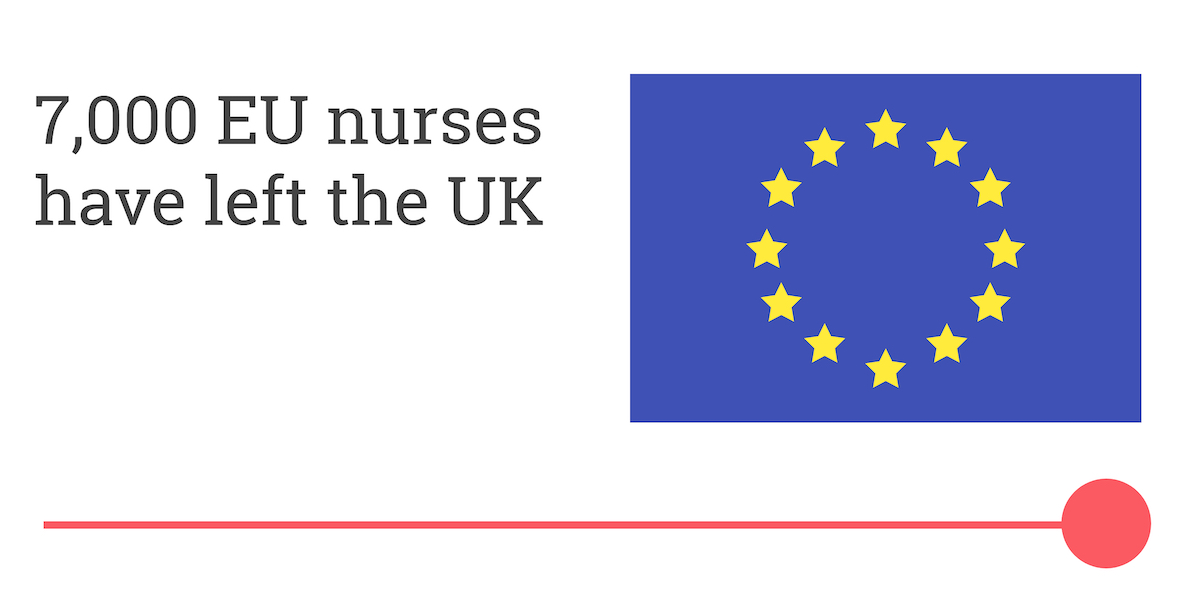


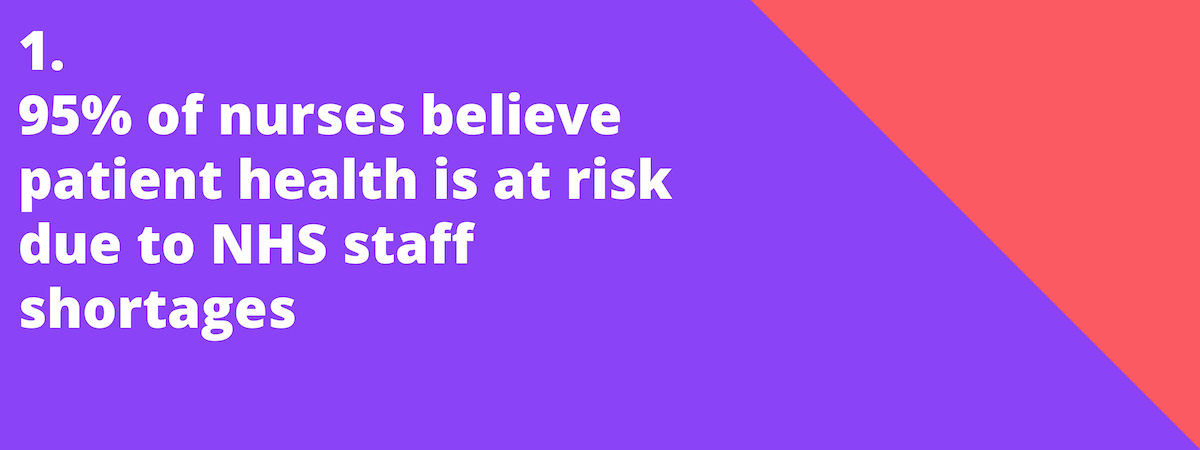
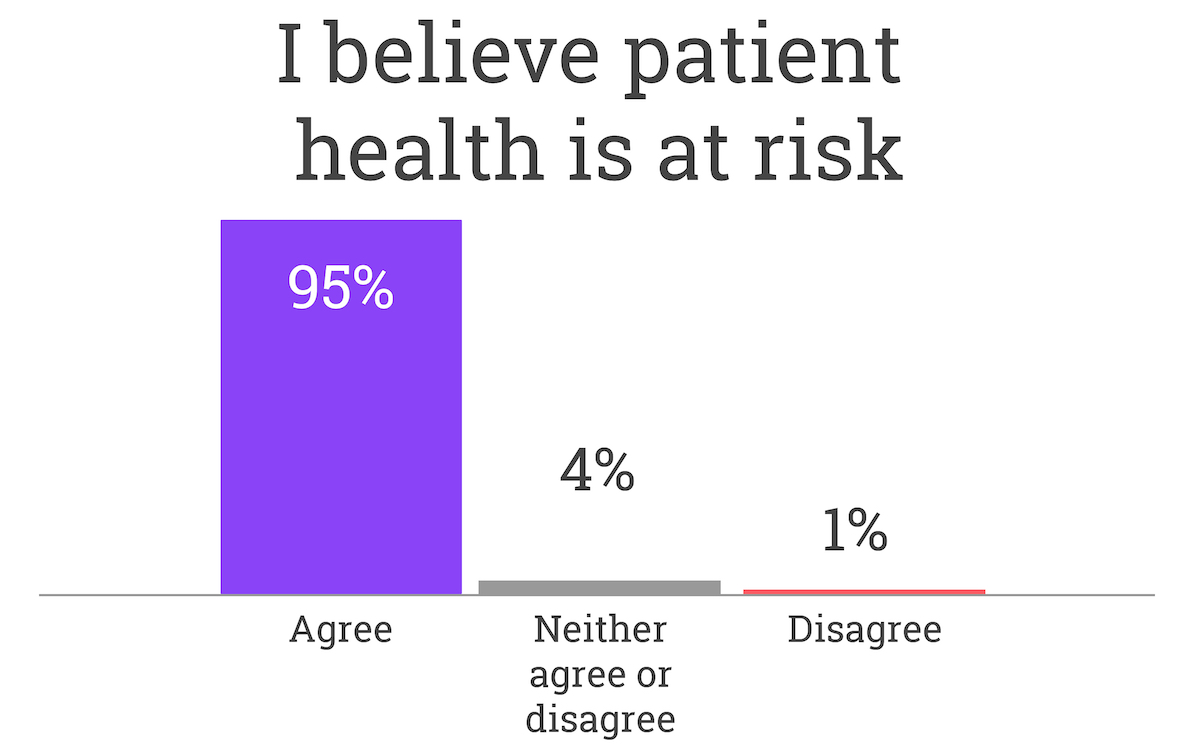

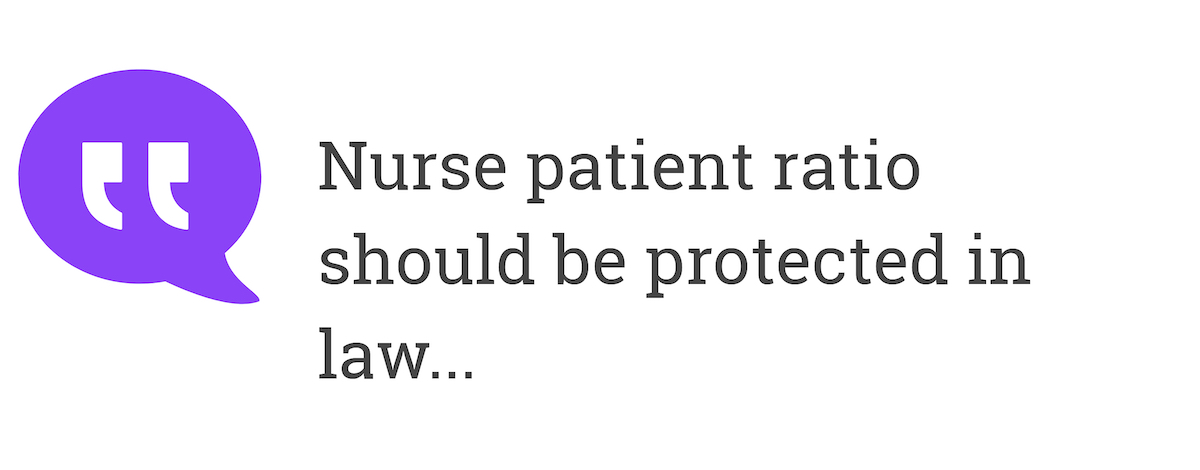

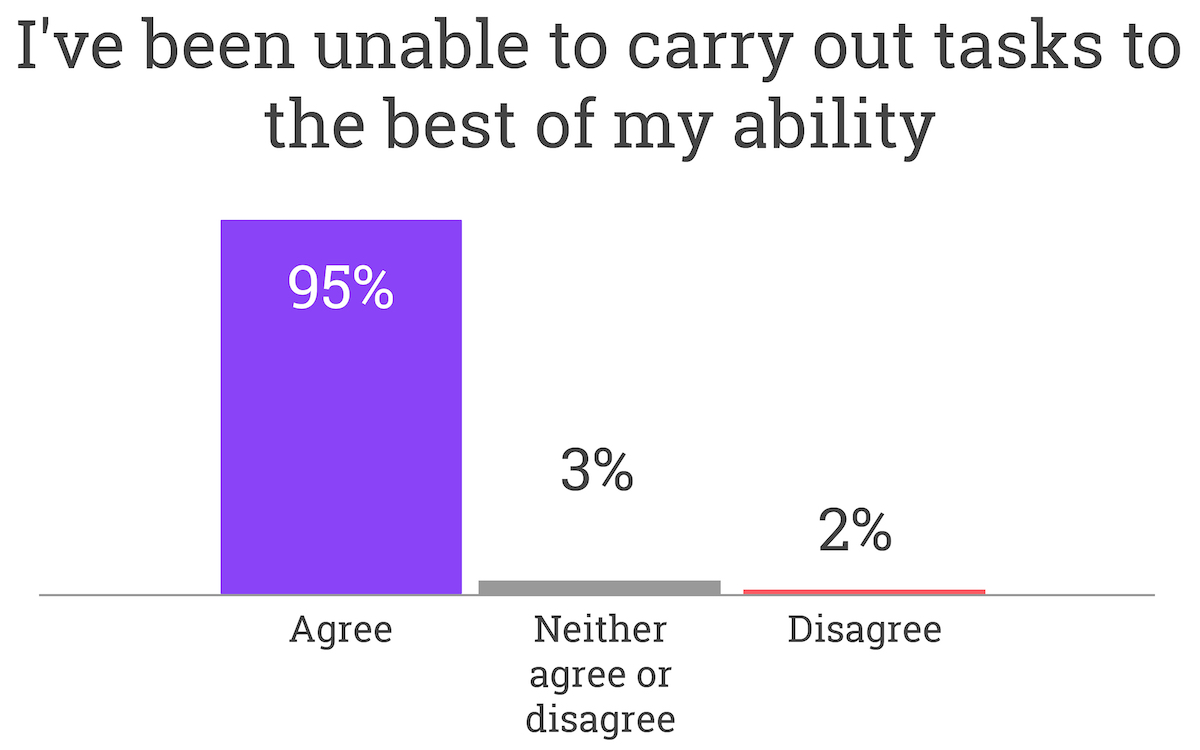
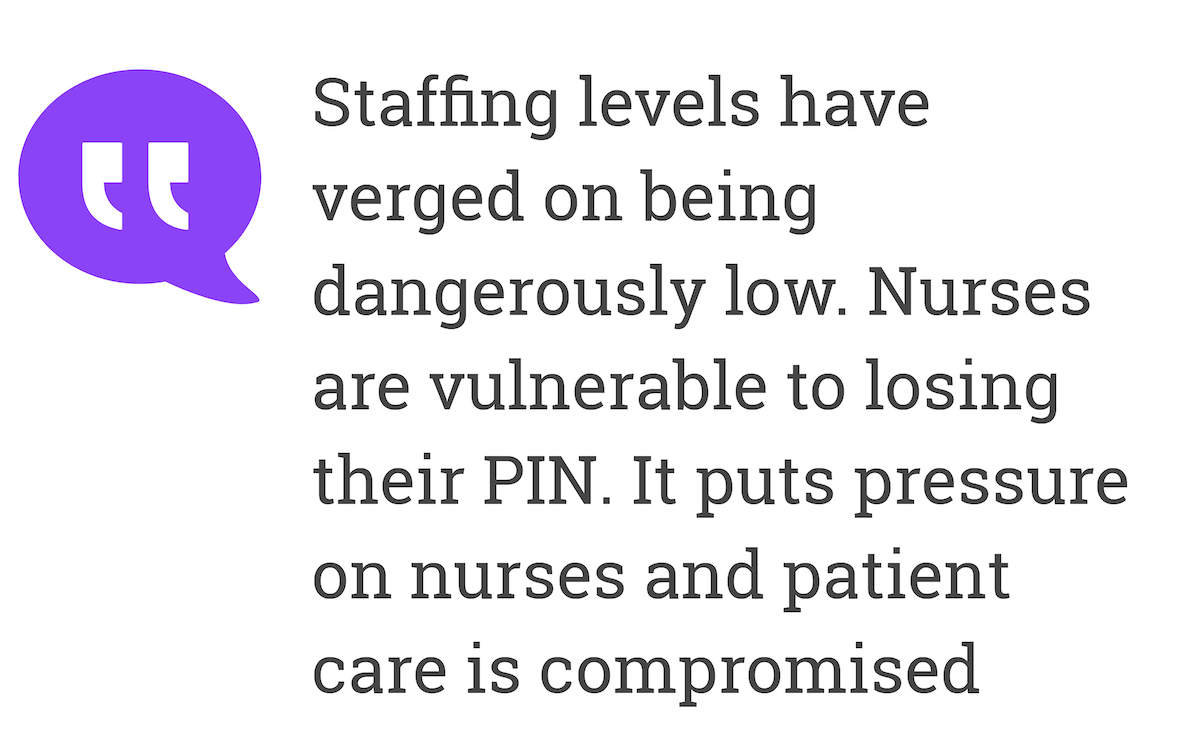
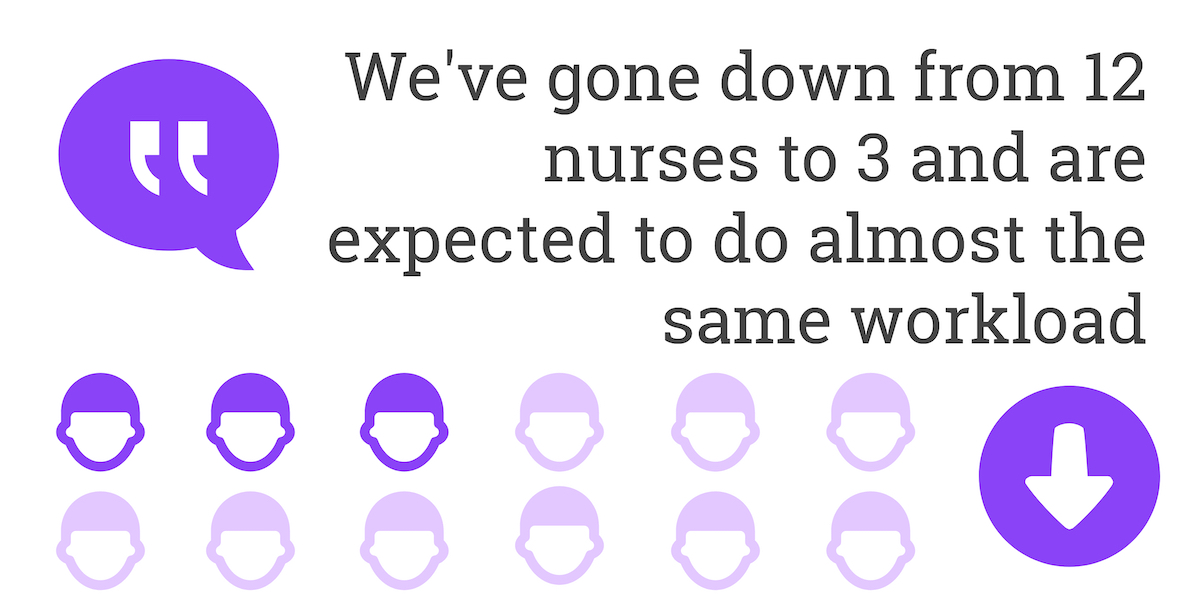


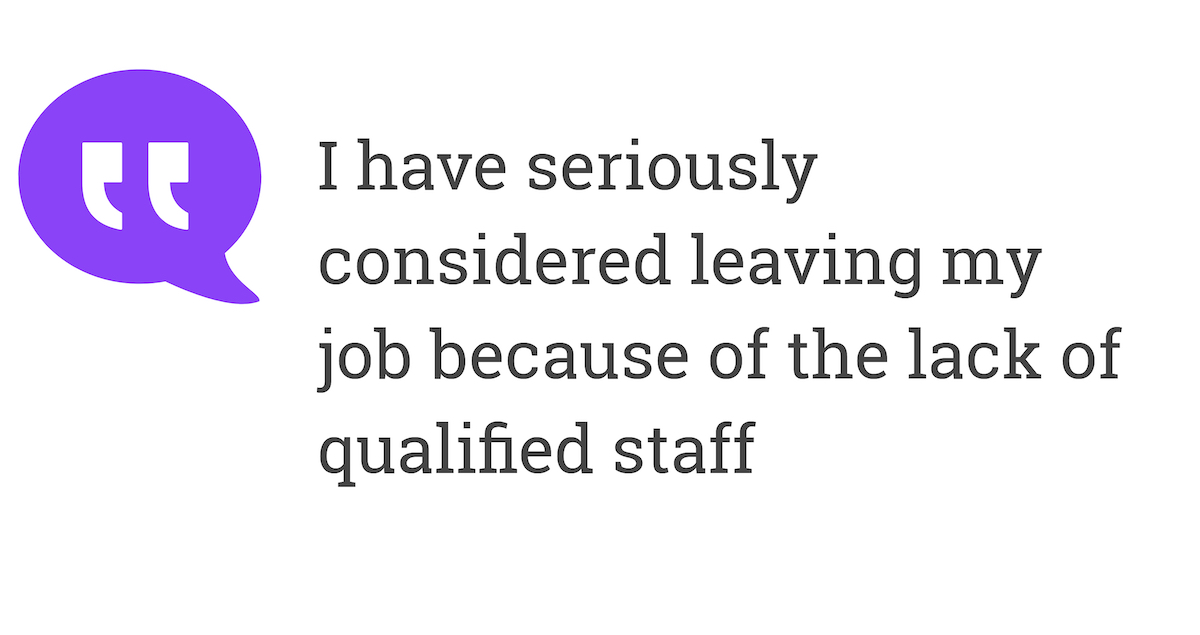
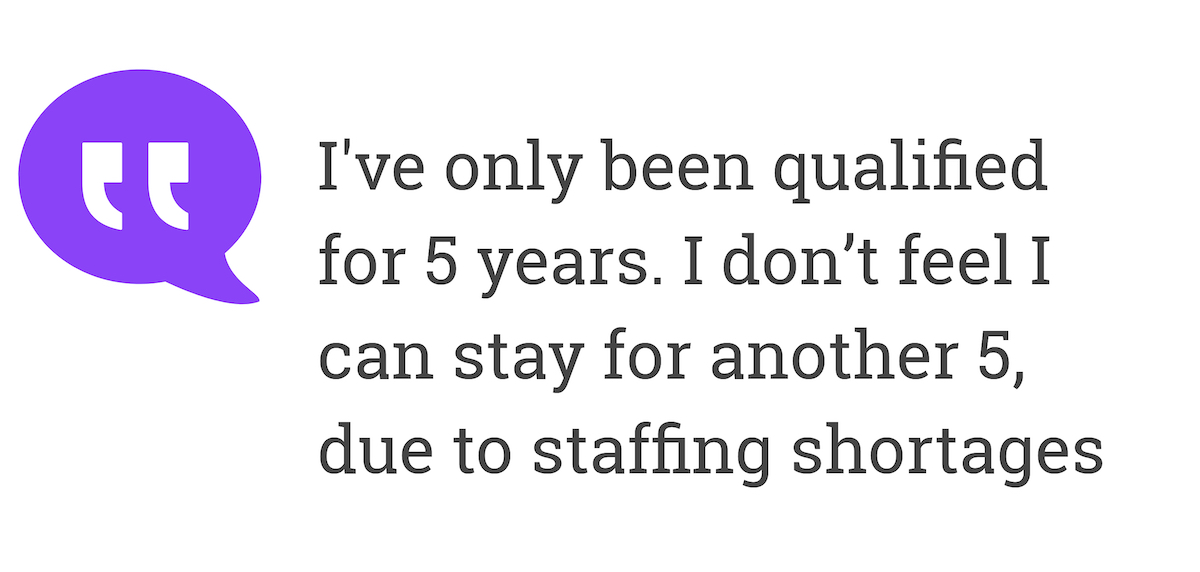
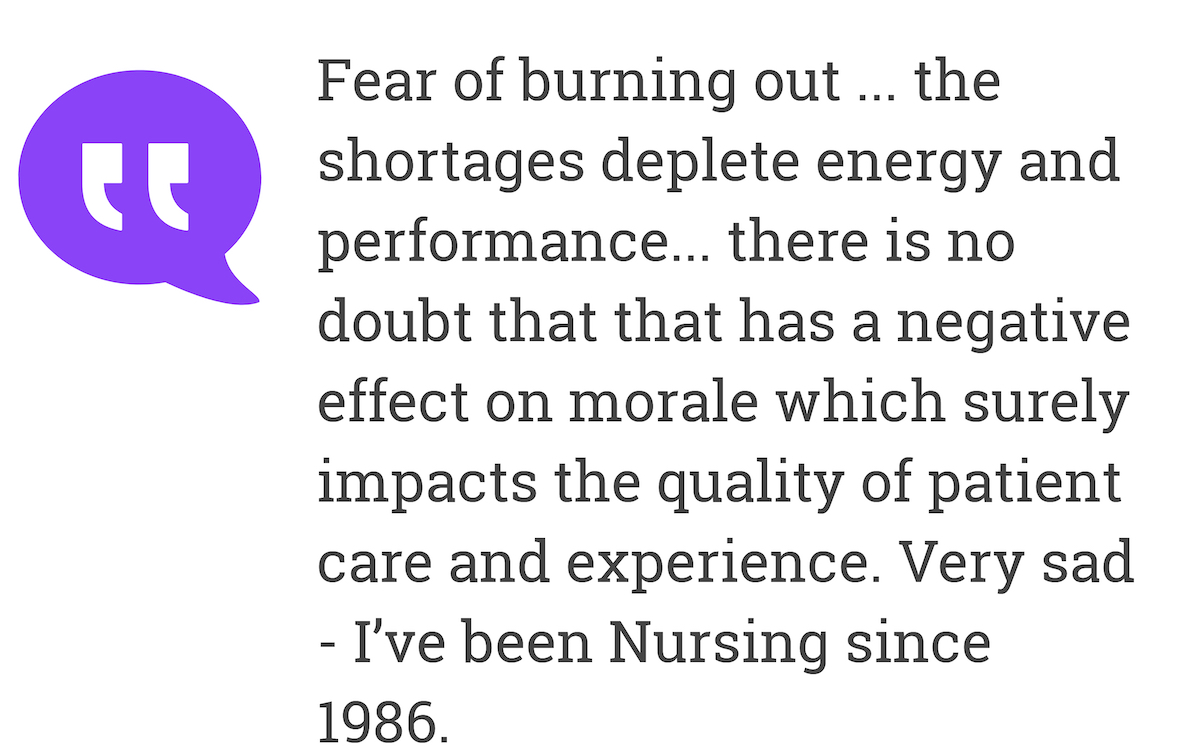
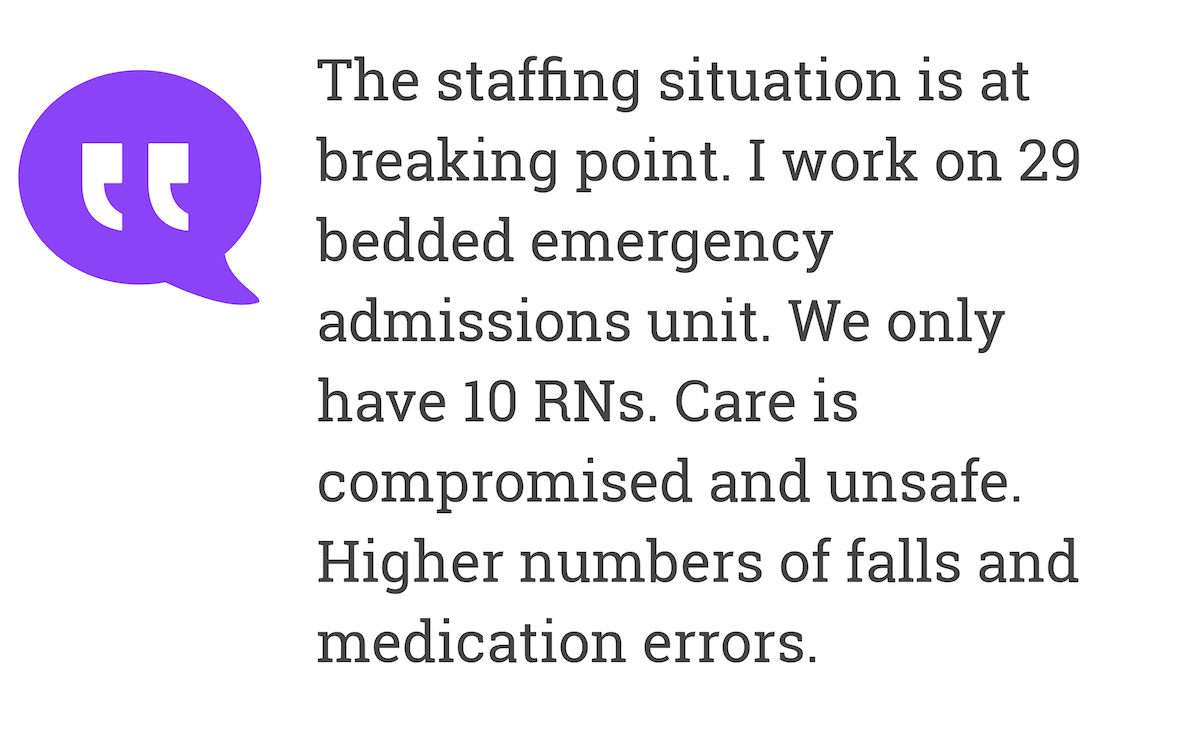
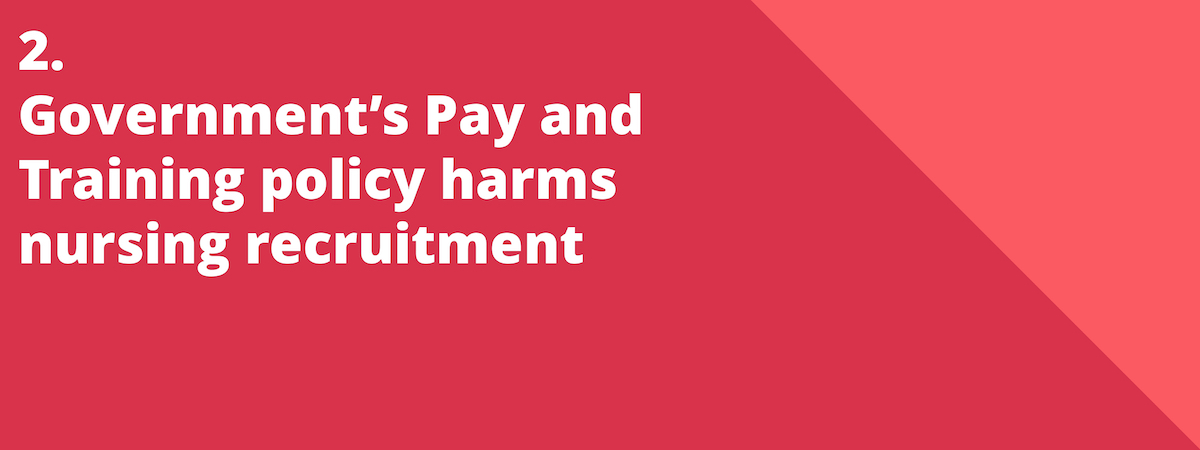
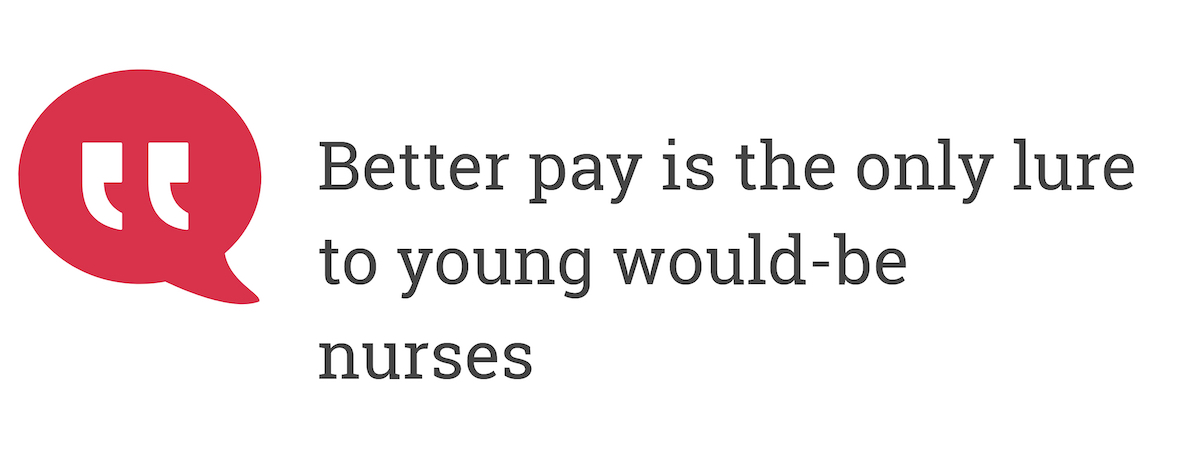

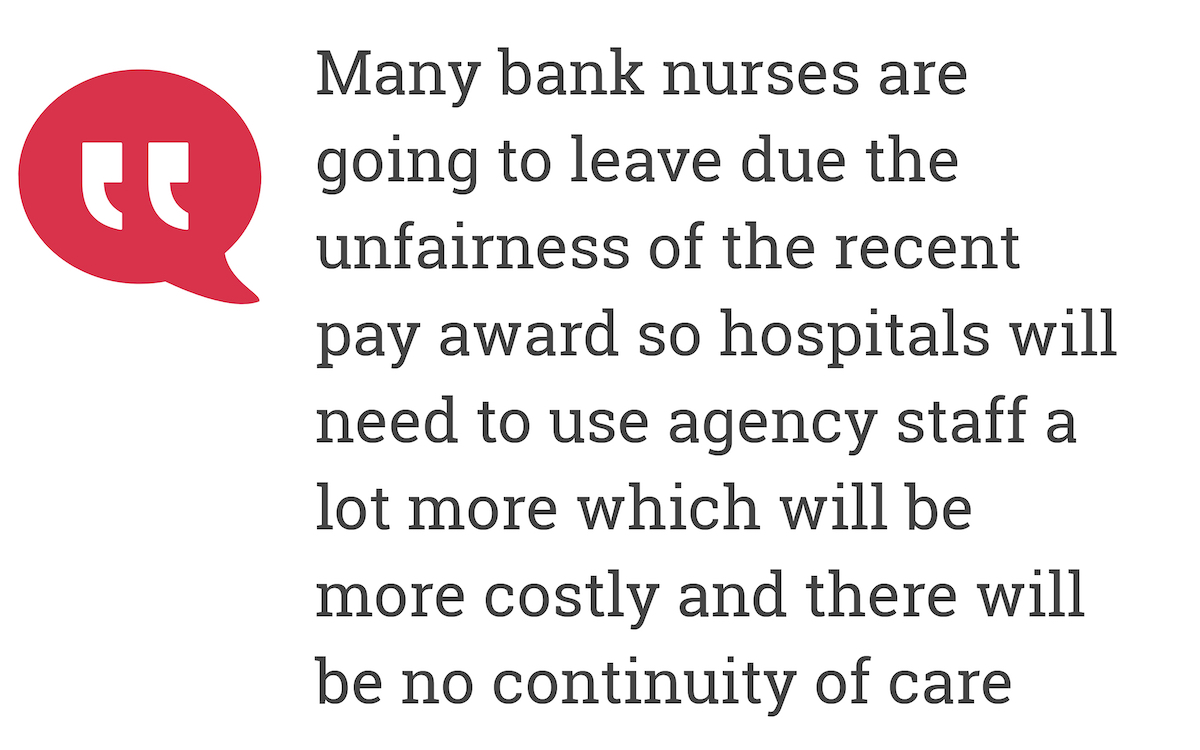

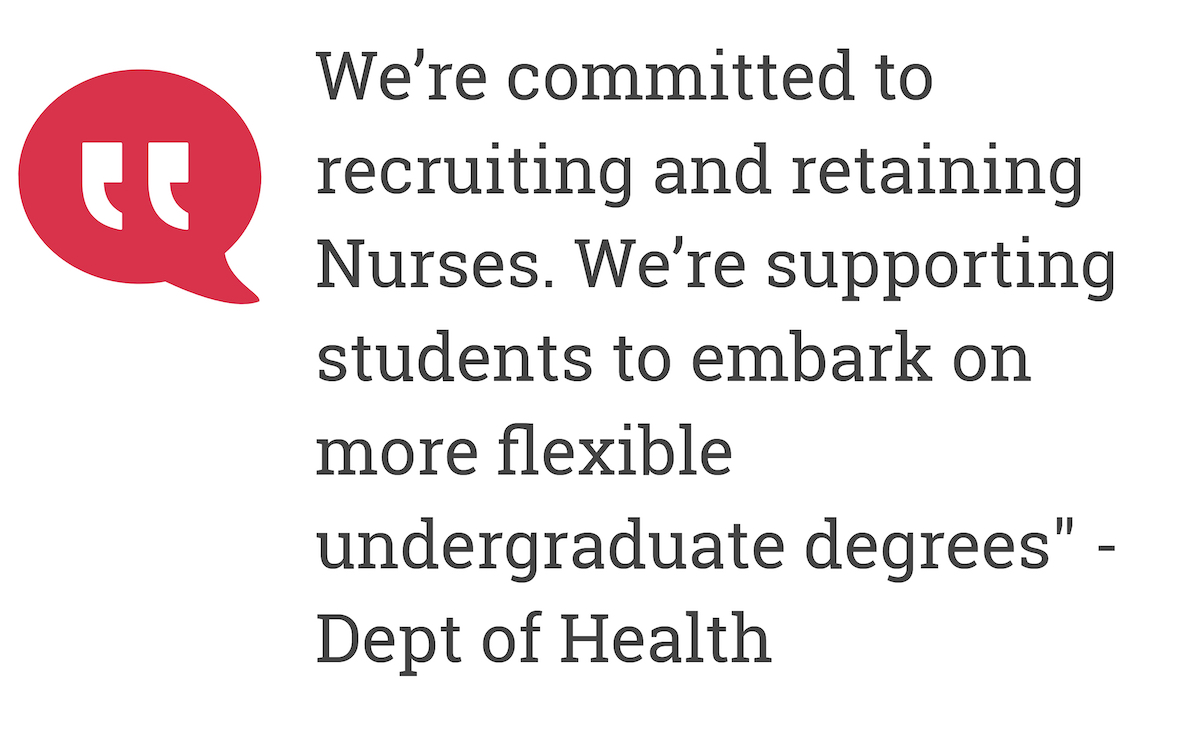

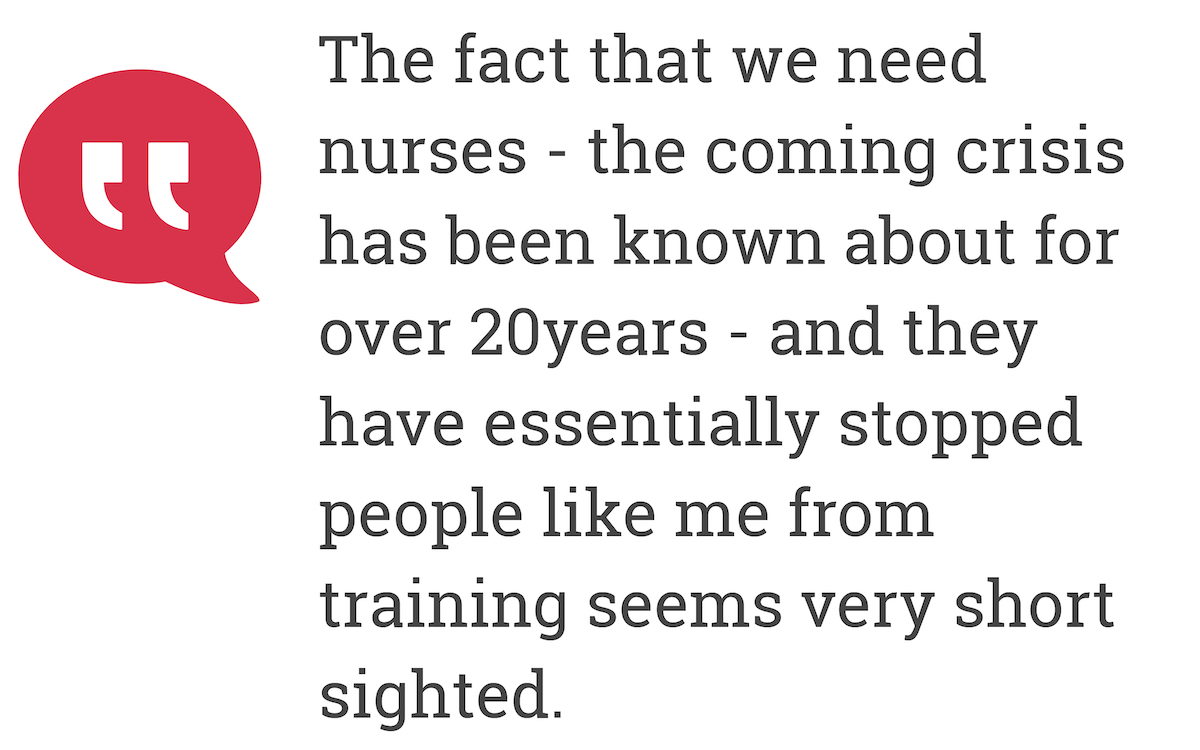
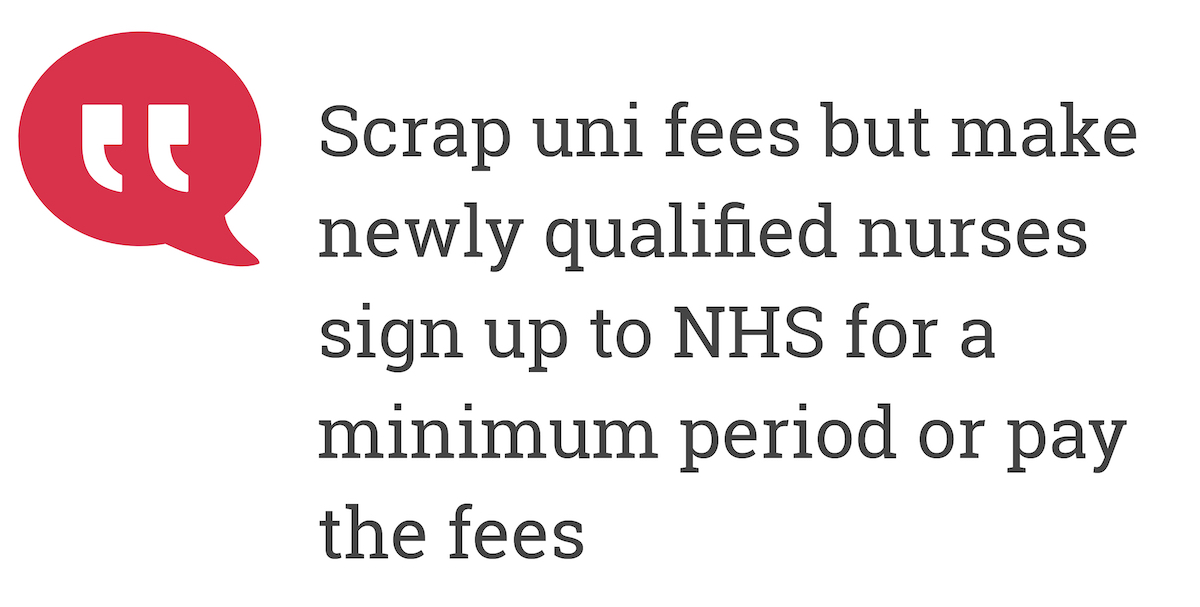







About this contributor
Nurses.co.uk Founder
I launched Nurses.co.uk (and subsequently Socialcare.co.uk, Healthjobs.co.uk and Healthcarejobs.ie) in 2008. 600 applications are made every day via our jobs boards, helping to connect hiring organisations recruiting for clinical, medical, care and support roles with specialist job seekers. Our articles, often created by our own audience, shine a light on the career pathways in healthcare, and give a platform to ideas and opinions around their work and jobs.
More by this contributorWant to get involved in the discussion?
Log In Subscribe to comment